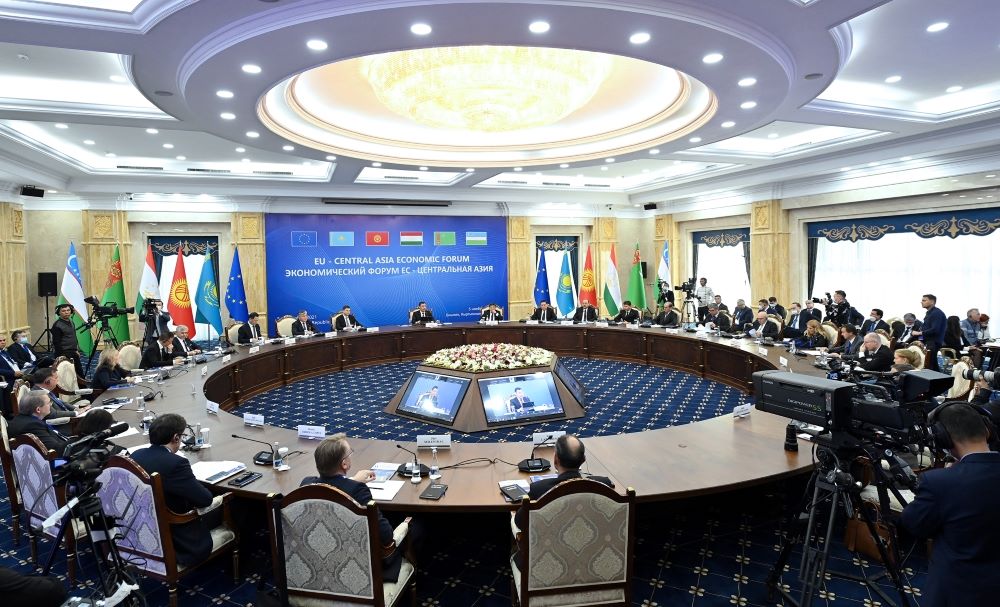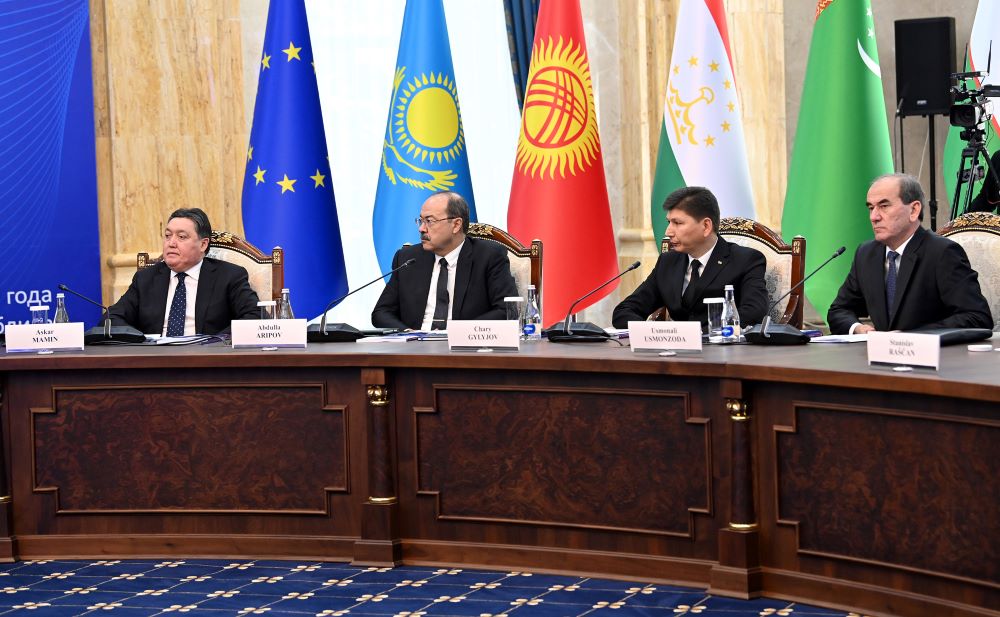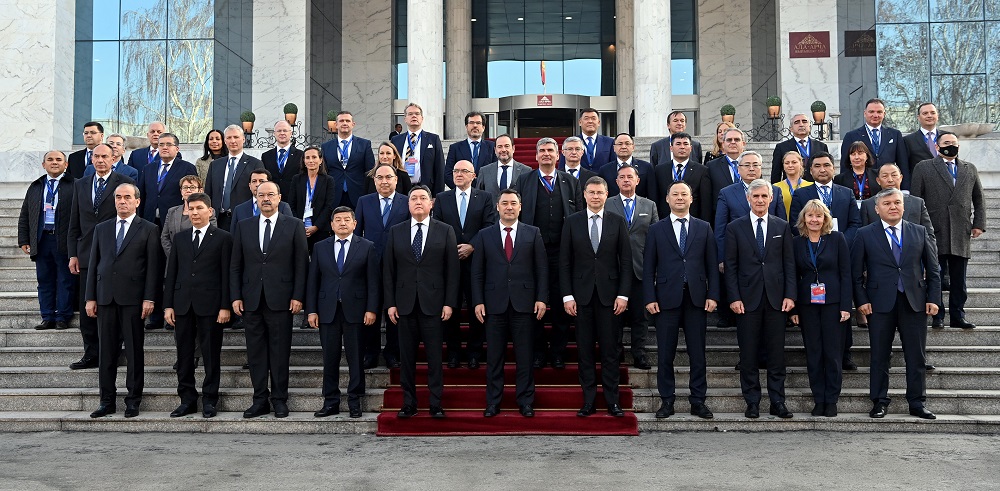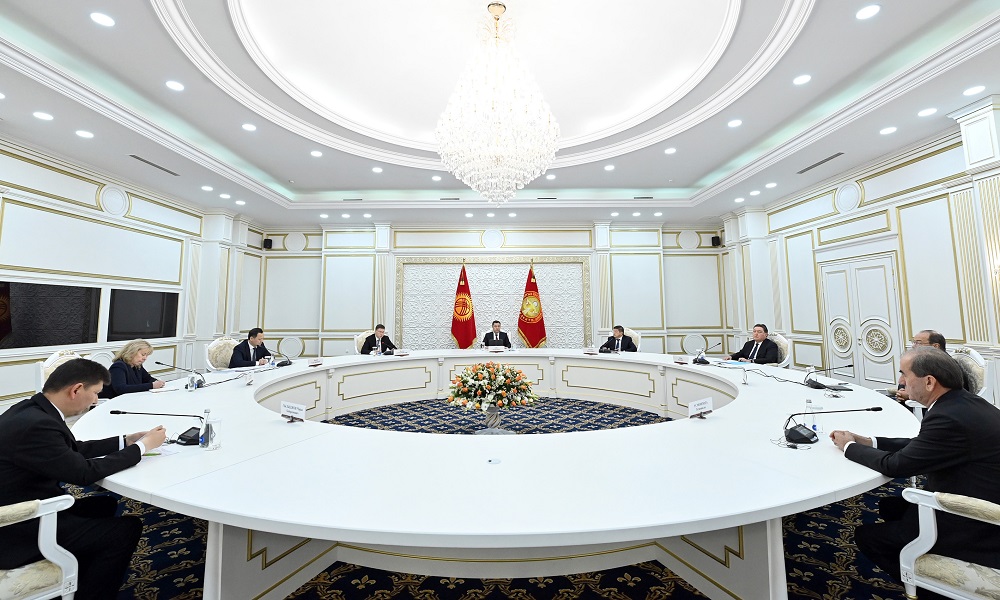Elvira Kadyrova
On 5 November 2021, Bishkek, Kyrgyzstan hosted the First International Economic Forum “Central Asia – European Union”.
The event gathered Prime Ministers and Deputy Heads of Government of Central Asian countries, as well as ministers and senior officials from over 15 EU member-states, representatives of the private sector of the EU and Central Asia, international financial institutions, international organizations and civil society.
The European Union was represented by the Executive Vice-President of the European Commission and Commissioner for Trade Valdis Dombrovskis.
The President of the European Commission, Ursula von der Leyen, delivered a video message. She spoke about how cooperation between the EU and Central Asia can help the economic recovery, adding that “it can make Central Asian economies stronger, fairer and more sustainable in the long run. This is exactly what we are pushing for in Europe, too.”
The meeting was the first event within the framework of the EU Strategy for Central Asia, adopted in 2019. The forum’s discussions focused on three main areas – green economic recovery, digitalization, and improvement of the business environment.
Following the event, a joint press statement was published.
Kazakhstan will host the second economic forum “European Union-Central Asia”. The gathering will be held annually, alternately in each of the capitals of the participating countries.
President of Kyrgyzstan: we can state the beginning of a new stage of expanding cooperation between the EU and Central Asia
“The European Union Strategy for Central Asia, presented in Bishkek in 2019, allowed us to initiate the creation of a new platform for economic cooperation,” President Sadyr Zhaparov said, during his welcoming remarks.
Zhaparov pointed out that today’s significant transformations in the world open up the opportunity to build more creative relations through cooperation and harmonious partnership, mutual improvement of well-being, and the CA-EU forum has the potential to build such partnerships.
As he stressed, countries have all the necessary conditions to achieve this goal. Both regions share the tasks of building more innovative, sustainable and inclusive national economies, have common values of freedom, justice and equality.
The President of Kyrgyzstan also underlined the growing attractiveness of the Central Asian region in terms of prospects for trade, economic and investment cooperation.
According to the World Bank, in 1993 the GDP of the Central Asian countries was US $ 45 billion, and by 2019 it had grown 8 times and reached US $347 billion; it is expected that by 2030 the GDP will almost double and near US $ 610 billion.
“Today we can witness the beginning of a new stage in the expansion of cooperation between the European Union and Central Asia, which inspires us with well-founded optimism. I am particularly pleased to note that this rapprochement meets the goals and objectives of the new European Union Strategy for Central Asia, approved in Bishkek in 2019,” President Zhaparov stressed.
EU Executive Vice President Valdis Dombrovskis on promising vectors of EU-CA cooperation
In his speech, Dombrovskis confirmed the EU’s commitment to continue to support the efforts of the Central Asian region to overcome the socio-economic consequences of the pandemic.
He also touched upon the Afghan issue, assuring the Central Asian partners that the EU’s “aim is to work with the Central Asian countries to manage this very challenging situation.” Efforts already underway include support for displaced Afghans and host communities, migration management and measures to prevent terrorism, organized crime and human trafficking.
The European Commissioner walked through the three key topics on the forum’s agenda – green recovery, digitalization and improvement of the business environment. Here is a related excerpt from the text of his remarks:
«First, on the green recovery. The EU is convinced that the COVID-19 pandemic has opened a political window of opportunity for global climate action. Every region of the world is developing its plans for economic recovery, so we must use this opportunity to accelerate the climate-resilient transformation of our economies.
We want to work with our global partners to find the opportunities in the fight against climate change.
In this respect, we welcome the commitment of Central Asian governments to reduce emissions.
Our recovery efforts and investments need to pave the way to a more resilient and sustainable future. We owe this to the next generation.
We must avoid falling back into carbon- and resource-intensive models, and we need to ensure that alternatives to coal and fossil fuel are both attainable and affordable.
It is clear that the pattern of trade between the EU and Central Asia will evolve. Access to resources is a strategic question for Europe’s ambition to deliver our Green Deal targets. In order to reduce CO2 emissions, we will aim to import fewer carbon-intensive products, while strengthening cooperation with our partners on critical raw materials.
We know that proper financing is the key to climate action. The EU and member states’ overall contribution amounts to at least one third of total international climate finance.
I look forward to exploring possible areas of enhanced cooperation with all Central Asian countries in the transition to a greener economy. Our regional programmes and investment facilities will continue to support Central Asia’s shift to sustainable consumption and production.
We will continue to promote investment in renewable energy and solid waste management.
And we stand ready to leverage the full scope of Team Europe to help respond to water, energy and climate needs in the region.
Second, on digitalisation. We believe that further progress is imperative to increase the efficiency and transparency of the public sector and the competitiveness of the private sector.
We welcome the adoption of national digital strategies by all Central Asian states, and we urge you to continue reforms, particularly in e-governance.
Digitalisation offers not only better connectivity opportunities; it is also crucial for ensuring education for all and facilitating new job creation, especially among women and youth, and for reducing regional disparities.
Through Team Europe, we intend to support ambitious people-centred digitalisation in Central Asia.
[…]
Finally, on a better business environment.
A healthy business climate is essential for diversifying production, employment and exports. This in turn helps to make growth more robust, sustainable and inclusive.
An improved business climate can open the way for new domestic and international investors. But to be legitimate, this requires the sustained commitment of political players at the highest level.
During this visit I have met political leaders and I have heard from business stakeholders, and I am convinced there is strong potential for further cooperation in a business and investment context.
[…]
Three regional EU programmes will support entrepreneurship and regional trade.
Direct financing of small and medium-sized enterprises, in combination with business advice, trade facilitation and e-commerce, will contribute to diversifying economic activity. By increasing SMEs’ access to regional and global markets, we increase their capacity to expand, become more competitive, and create jobs.
The EU has committed significant resources to Central Asia, and we will continue to do so. At the same time, let me stress that only private, market-driven investment will ensure that new initiatives are financially sustainable.”
Dombrovskis invited the Central Asian countries to benefit from the EU’s extensive experience in the field of legal regulation of exports of goods and services. The main condition for attracting private capital is stable, safe and predictable business climate. And this, in turn, requires putting in place right incentives and legal certainty.
EU-Central Asia Economic Forum – Joint press statement
On the occasion of the first in-person European Union-Central Asia Economic Forum with particular attention to green recovery, digitalisation and better business environment and in line with the EU strategy on Central Asia, which focuses on promoting resilience, prosperity, and regional cooperation, the participants reaffirmed their firm commitment to strengthen the EU-Central Asia cooperation to support transformation of the economies of Central Asia into diversified and competitive private-sector driven economies that can create jobs, integrate in regional and global value chains, and provide opportunities and a level-playing field for all economic actors, as well as help Central Asian states build back better.
To that end, and taking into account the three priority areas of the Forum, participants:
- Recognised the devastating economic and social harm brought by the COVID-19 pandemic and acknowledged the significant EU support under the Central Asia COVID-19 Crisis Response Programme and direct EU assistance provided through the Regional Indicative Program for Central Asia for 2021-2027.
- Welcomed continuous EU support to Central Asian states via European financial institutions through the EU’s blending facilities, technical assistance and guarantee instrument.
On transition to a green recovery
- Expressed concerns about the effects of climate change on water, energy resources in Central Asia, which threaten sustainable development of the region.
- Welcomed commitment of Central Asian governments expressed in their national determined contributions to reduce emissions, while also noting that this is important for the health of Central Asia’s people, affirmed readiness to continue joint fighting against climate change and stressed the importance of preservation of biodiversity.
- Acknowledged Central Asia’s potential to generate clean and climate neutral renewable energy and the need to develop and adopt policies that ensure transition to a net-zero-emissions economy, attract investments in renewable energy sources, encourage emissions-reducing innovations and enable/facilitate intra-regional trade in sustainably generated electricity.
- Recognized the need to attract green and climate finance for the implementation of green and climate-resilient projects by sectors of the economy for the progressive transition of Central Asian states to a green economy.
- Highlighted the green investments and dialogue opportunities created by the EU Strategy on Central Asia, the EU-funded Central Asia Water and Energy Programme and Enhanced Regional Co-operation on Environment, Climate Change and Water Programme, SWITCH-Asia, which can support Central Asia’s shift to sustainable consumption and production, and also the Investment Facility for Central Asia, which promotes investment in renewable energy and the management of household and industrial waste. Also welcomed the implementation of Sustainable Energy Connectivity in Central Asia programme.
On digitalisation
- Recognised that progress in digitalisation is imperative in increasing efficiency and transparency in the public administration system, increasing the level of citizens’ involvement in the state and municipal decision making processes and competitiveness of private sector. To that end stressed the EU’s valuable experience and expertise that can greatly facilitate Central Asia’s digital transformation.
- Welcomed the adoption of national digital strategies by all Central Asian states and noted the progress of recent reforms, particularly in e-government, before and during the pandemic. Stressed the need to develop action and interoperability plans to accompany these strategies, as well as to adopt enabling policies to attract investments in resilient and secure ICT infrastructure, including cross-border.
- Reiterated the need to improve quality and coverage of digital infrastructure and increase internet penetration to ensure inclusive access and education opportunities as well as for all citizens and businesses, especially in rural areas, thus strengthening cohesion and reducing digital gap and regional disparities.
- Stressed the importance of initiatives to improve digital infrastructure, like the World Bank’s Digital CASA and the EU’s support and welcomed the development of a high-performing digital education ecosystem, which is the first strategic priority of the EU’s Digital Education Action Plan for 2021‒27, and which will be soon piloted in Central Asia.
- Welcomed the exchange of experience between the EU and Central Asian countries in the field of digitalization in such sectors as public and municipal services, economy, education, etc.
On creation of a sound business environment
- Affirmed that a healthy business climate is essential for increasing employment and diversifying production and mutual exports, including exports of manufactured goods, to facilitate connectivity between the EU and Central Asia and make growth more sustainable and inclusive. Participants stressed the necessity to continue working together on reforms improving the business climate in Central Asia, via for instance the EU Central Asia Invest Programme, including the OECD policy component.
- Anticipated further strengthening of EU and Central Asia trade relations and welcomed the new EU Ready4Trade programme, acknowledging its beneficial impact on region’s businesses and in particular small and medium enterprises (SMEs). Recalled that further efforts are needed to increase export-readiness and competitiveness of SMEs.
- Acknowledged the interest of the GSP-qualifying Central Asia states in continuing to benefit from GSP or GSP+ preferences after the reform of the system. All participants called for further strengthening of the trade and economic cooperation between the EU and Central Asia by promoting diversification of trade between the parties, and by strengthening integration of Central Asia states into the international trading system, which would further increase investment attractiveness of Central Asia countries as well as boost their international image.
- Recognised the importance for the facilitation and growth of trade via harmonising regulations, technical standards, and customs regimes on the basis of international and EU standards and practices, in the context of implementation of the WTO and bilateral Enhanced Partnership and Cooperation Agreements’ commitments and continued inter-and intra-regional dialogue.
- Reiterated the need for reforms that would be conducive to private sector and in particular SME development and formalisation, especially in the area of taxation, increased legal certainty, efficacy of the judicial system and the strengthening of business-to-government dialogue. Stressed the need to reduce red tape and streamline regulatory compliance to minimise bureaucratic burden and cost implications for the private sector.
- Confirmed that further progress is needed to improve corporate governance, support market-orientation and, where appropriate, privatisation of State Owned Enterprises so as to enhance competition, increase productivity, promote entrepreneurship, and contribute to sustainable economic growth.
A look into the future
Participants agreed that the Forum gives an impetus for a regular follow-up and review of progress in each of the three priority areas and that close intra-regional co-operation will be imperative in the successful implementation thereof.
Recognized that the Forum created the conditions for the development of a common innovative economic response to COVID-19, as well as allowed for facilitating the implementation of the EU Strategy for Central Asia and contributed to transformation to green economy.
The report, which will be prepared following the Forum, will take note of the discussions for future occasions.
President of Kyrgyzstan met heads of delegations of Central Asian countries and the Vice-President of the European Commission
President of the Kyrgyz Republic Sadyr Zhaparov met with heads of delegations of Central Asian countries and Executive Vice-President of the European Commission Valdis Dombrovskis on the sidelines of the First Economic Forum “European Union – Central Asia”.
“It is very symbolic that the Forum has been launched this year, when all the Central Asian countries celebrated the 30th anniversary of their independence, and the European Union actively cooperated with all of us, providing support for democratic and market reforms,” he said.
President Sadyr Zhaparov expressed hope that the forum will become an effective communication bridge between governments, the private sector, and international financial institutions and will contribute to the comprehensive development of relations in trade, investment, innovation and other areas of mutual interest.
In addition to the three topics of the forum, Zhaparov proposed for consideration another area related to strengthening human potential, especially for young people, by creating access to high-quality and affordable education.
Kyrgyz leader also touched upon the regional security. “The situation in Afghanistan now worries not only the region, but the whole world. The certain international agencies predict the worsening of humanitarian situation in Afghanistan. At this challengeable time, the Afghan people need our help,” he said.
In turn, Vice-President of the European Commission Valdis Dombrovskis noted that this forum is an important stage in regional cooperation between Central Asia and the European Union. He added that the European Union is interested in developing interaction between the two regions.
Prime Minister of Kazakhstan Askar Mamin stressed that the Central Asian region is developing dynamically. According to him, the economic forum will be a good signal to identify the opportunities of the region.
Prime Minister of the Republic of Uzbekistan Abdulla Aripov told that the meeting will create new cooperation opportunities for business and government agencies of Central Asian countries and the European Union.
Deputy Prime Minister of Tajikistan Usmonali Usmonzoda said that the countries of Central Asia need the support of the European Union.
Deputy Chairman of the Cabinet of Ministers of Turkmenistan Chary Gylydjov expressed confidence that the economic forum will encourage the cooperation both in the regional format and with the European Union.
Important links:
Speech by President von der Leyen at the EU-Central Asia Economic Forum
https://ec.europa.eu/commission/presscorner/detail/en/speech_21_5803
Factsheet on EU-Central Asia relations
https://eeas.europa.eu/sites/default/files/eeas-ca_ministerial_factsheets-2020-regional-v5.pdf
///nCa, 8 November 2021 (based on the press-releases of the European Commission, press-service of President of Kyrgyzstan. Photo credit – press-service of President of Kyrgyzstan)



